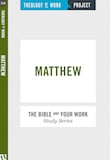Tales of Two Kingdoms (Matthew 11-17)
Bible Commentary / Produced by TOW Project
My Yoke Is Easy (Matthew 11:28-30)
Back to Table of Contents Back to Table of ContentsAs we walk through Matthew’s Gospel, we see that opposition to Jesus—his message and his actions—is increasing. It culminates in Matthew 12:14 with the religious leaders’ decision to stop him, even if it means killing him. This foreshadows and sets in motion the end to which the whole narrative is pointing: Jesus’ crucifixion in Jerusalem. Knowing what lies ahead of him, Jesus nevertheless tells his followers,
Come to me, all you that are weary and are carrying heavy burdens, and I will give you rest. Take my yoke upon you, and learn from me; for I am gentle and humble in heart, and you will find rest for your souls. For my yoke is easy, and my burden is light. (Matt. 11:28-30)
If we do our work in yoke with him, we will find fulfillment and experience good relationships with God and people.[1] When God gave work to Adam in the Garden of Eden, the work was easy and the burden light under God's authority. When the human pair rebelled against their Maker, the character of work changed to hard labor against thorns and thistles (Genesis 3). Jesus invites us to work in yoke with him with the promise of rest for our souls. (For more on working in yoke with Christ, see "2 Corinthians 6:14-18" in 2 Corinthians and Work at www.theologyofwork.org.)
For an application of this passage, see "Change Tactics as You Grow" at Country Supply Study Guide by clicking here.
Working on the Sabbath (Matthew 12:1-8)
Back to Table of Contents Back to Table of ContentsMaking Time Off Predictable and RequiredRead more here about a new study regarding rhythms of rest and work done at the Boston Consulting Group by two professors from Harvard Business School. It showed that when the assumption that everyone needs to be always available was collectively challenged, not only could individuals take time off, but their work actually benefited. (Harvard Business Review may show an ad and require registration in order to view the article.) Mark Roberts also discusses this topic in his Life for Leaders devotional "Won't Keeping the Sabbath Make Me Less Productive?" |
One of the chief areas of conflict between Jesus and his opponents was in keeping the Sabbath. In this passage, Jesus is criticized by religious leaders for allowing his followers to pluck and eat grain on the Sabbath. The Pharisees regarded this as work, which was forbidden on the Sabbath. Jesus dismisses both their interpretation and their motivation. He argues that plucking just enough grain to satisfy immediate hunger does not break the Sabbath, because both King David and the temple priests did so without incurring God’s rebuke (Matt. 12:3-5). Moreover, true adherence to the Law of Moses should be motivated by compassion and mercy (Matt. 12:6). God’s love of mercy (allowing hungry people to pick grain to eat) is higher than God’s desire for sacrifice (following Sabbath regulations), as had already been revealed in Micah 6:6-8. The gift of a day of rest each week is a promise from God that we do not have to work incessantly just to make ends meet. It is not a judgment against relieving someone’s hunger or need on the Sabbath.
The connection between the Jewish Sabbath and the Christian worship on Sunday, and the application of Jewish Sabbath law to the Christian life are discussed in greater depth in the sections on "Mark 1:21-45" and "Mark 2:23-3:6" in Mark and Work, the sections on "Luke 6:1-11; 3:10-17" in Luke and Work, and in the article Rest and Work at www.theologyofwork.org.
Parables of the Kingdom (Matthew 13)
Back to Table of Contents Back to Table of ContentsBeginning in chapter 13, in the face of opposition, Jesus’ teaching style changes. Instead of proclaiming the kingdom clearly, he begins to speak in parables that are meaningful to believers but incomprehensible to unbelievers. Most of these brief stories are about workers: a sower planting a field (Matt. 13:3-9); a woman kneading yeast into bread (Matt. 13:33); a treasure-hunter (Matt. 13:44); a pearl merchant (Matt. 13:45-46); some fishermen (Matt. 13:47-50); and a householder (Matt. 13:52). For the most part, these are not stories about the work they depict. Jesus does not tell us how to properly sow a field, how to bake bread, or how to invest in commodities. Instead, Jesus uses material objects and human labor as elements of stories that give us insight into God’s kingdom. Our work is capable of bearing meaning, even in illustrating eternal realities. This reminds us that we and the world around us spring from God’s creation and remain parts of God’s kingdom.
Paying Taxes (Matthew 17:24-27 and 22:15-22)
Back to Table of Contents Back to Table of ContentsIn Jesus’ day, Jews paid taxes both locally to the Jewish temple and to the pagan government in Rome. Matthew records two separate instances depicting Jesus’ view on paying these taxes. The first incident is recorded in Matthew 17:24-27, where the collectors of the temple tax ask Peter whether Jesus pays that tax. Jesus, knowing of this conversation, asks Peter, “What do you think, Simon? From whom do kings of the earth take toll or tribute? From their children or from others?” Peter answers, “From others.” Jesus responds, “Then the children are free. However, so that we do not give offense to them, go to the sea and cast a hook; take the first fish that comes up; and when you open its mouth, you will find a coin; take that and give it to them for you and me.”
The second incident, concerning the Roman tax, is found in Matthew 22:15-22. Here the Pharisees and Herodians want to entrap Jesus with the question, “Is it lawful to pay taxes to the emperor, or not?” Jesus knows the malice in their hearts and responds with a cutting question, “Why are you putting me to the test, you hypocrites? Show me the coin used for the tax.” When they hand him a denarius, he asks, “Whose head is this, and whose title?” They respond, “The emperor's.” Jesus ends the conversation with the words, “Give therefore to the emperor the things that are the emperor’s, and to God the things that are God’s.”
Our true citizenship is in God’s kingdom, and we devote our resources to God’s purposes. But we give to earthly powers what is due. Paying taxes is one of the bedrock obligations we as citizens or residents undertake for the services we enjoy in any civilized society. Those services include the work of first responders (police, firefighters, medical people, and so on), as well as the social nets in place to assure justice or aid for the poor, the aged, and others in need. The Roman Empire was not governed primarily for the benefit of the common people, yet even so it provided roads, water, policing, and sometimes relief for the poor. We may not always agree on the type or extent of services our governments should provide, but we know that our taxes are essential in providing for our personal protection and for the help of those who cannot help themselves.
Even though not all of government activity serves God’s purposes, Jesus does not call us flout the tax requirements of the nations where we reside (Romans 13:1-10; 1 Thessalonians 4:11-12). Jesus is saying in essence that we do not necessarily have to resist paying taxes as a matter of principle. When possible, we should “live peaceably with all” (Romans 12:18; Hebrews 12:14; cf. 1 Peter 2:12), while also living as lights shining in the darkness (Matthew 5:13-16; Philippians 2:15). To work at our jobs and to refuse to pay our taxes in a way that brings dishonor to God’s kingdom would be neither peaceable nor winsome.
This has direct applications to work. Workplaces are subject to governmental laws and powers, in addition to taxes. Some governments have laws and practices that may violate Christian purposes and ethics, as was true of Rome in the first century. Governments or their employees may demand bribes, impose unethical rules and regulations, subject people to suffering and injustice, and use the taxes for purposes contrary to God's will. As with taxes, Jesus does not demand that we resist every one of these abuses. We are like spies or guerrillas in enemy territory. We can’t get bogged down in fighting the enemy kingdom at every stronghold. Instead, we must act strategically, always asking what will most further the establishment of God’s kingdom on earth. Of course, we must never engage in abusive practices for our own benefit. (This topic is also discussed under "Luke 19:1-10; 20:20-26" in Luke and Work at www.theologyofwork.org.)








